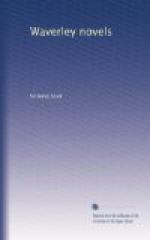While those who were in habitual intercourse with the real author had little hesitation in assigning the literary property to him, others, and those critics of no mean rank, employed themselves in investigating with persevering patience any characteristic features which might seem to betray the origin of these Novels. Amongst these, one gentleman, equally remarkable for the kind and liberal tone of his criticism, the acuteness of his reasoning, and the very gentlemanlike manner in which he conducted his inquiries, displayed not only powers of accurate investigation, but a temper of mind deserving to be employed on a subject of much greater importance; and I have no doubt made converts to his opinion of almost all who thought the point worthy of consideration. [Footnote: Letters on the Author of Waverly; Rodwell and Martin, London, 1822.] Of those letters, and other attempts of the same kind, the Author could not complain, though his incognito was endangered. He had challenged the public to a game at bo-peep, and if he was discovered in his ‘hiding-hole,’ he must submit to the shame of detection.
Various reports were of course circulated in various ways; some founded on an inaccurate rehearsal of what may have been partly real, some on circumstances having no concern whatever with the subject, and others on the invention of some importunate persons, who might perhaps imagine that the readiest mode of forcing the Author to disclose himself was to assign some dishonourable and discreditable cause for his silence.
It may be easily supposed that this sort of inquisition was treated with contempt by the person whom it principally regarded; as, among all the rumours that were current, there was only one, and that as unfounded as the others, which had nevertheless some alliance to probability, and indeed might have proved in some degree true.




